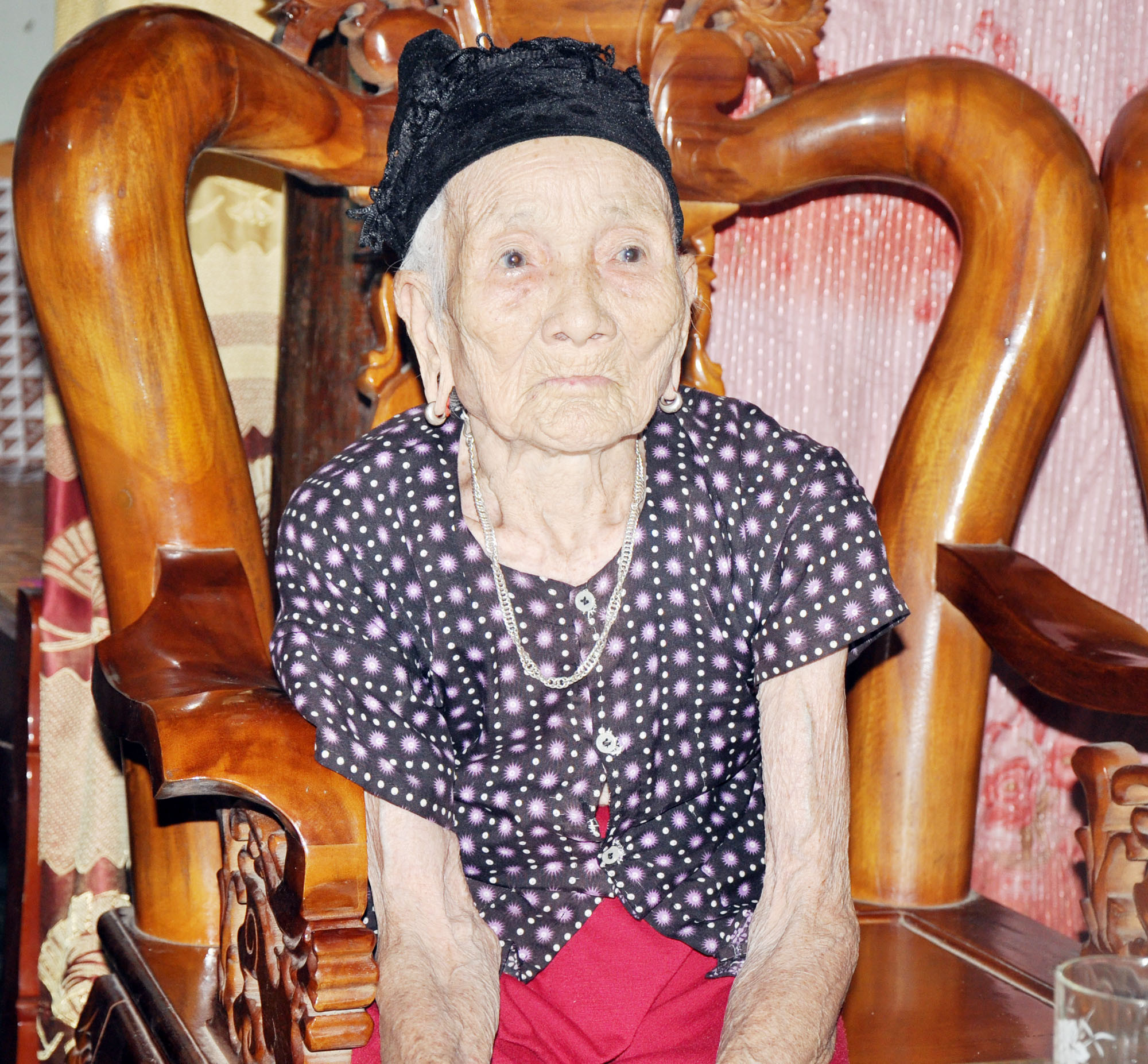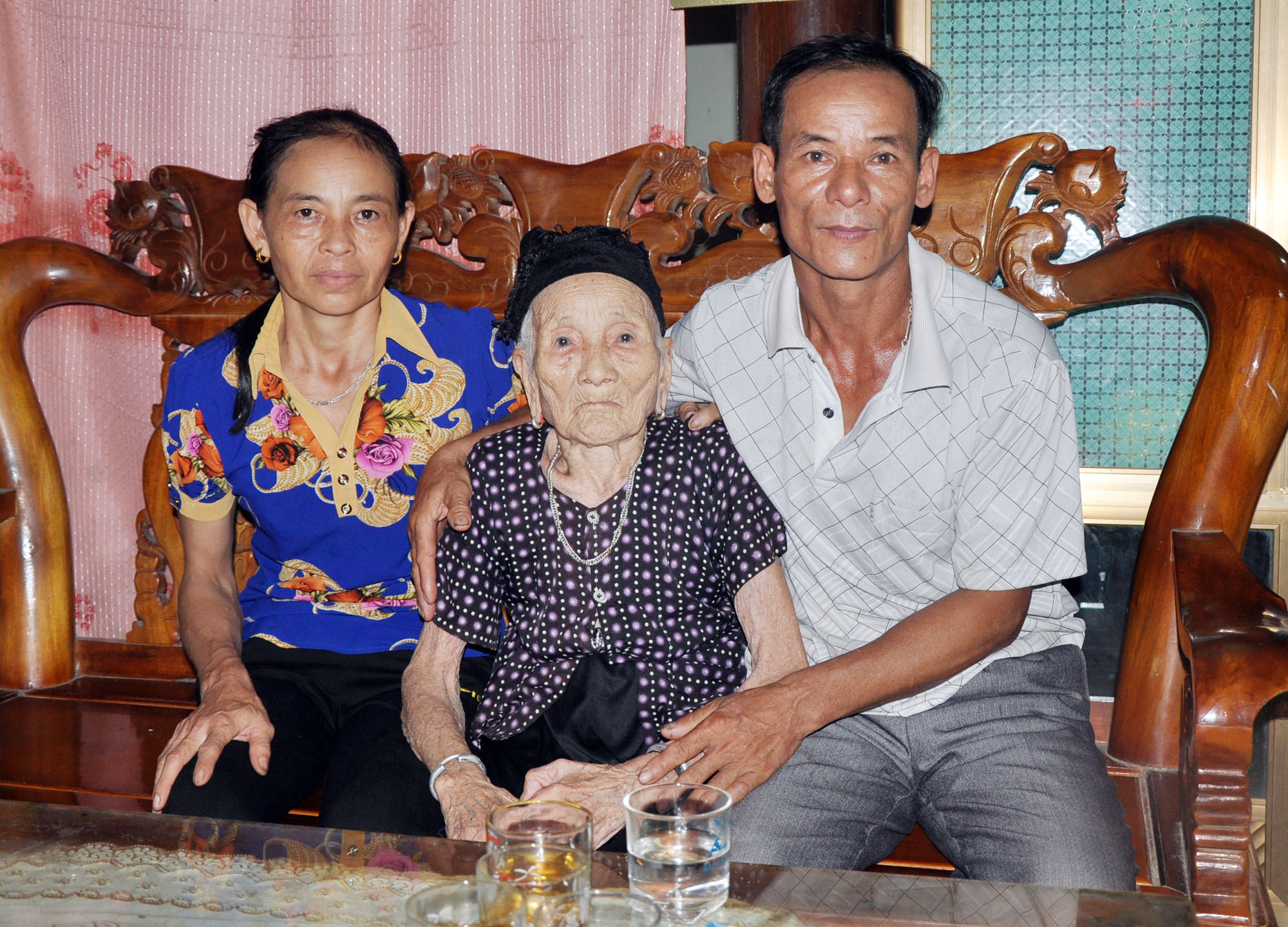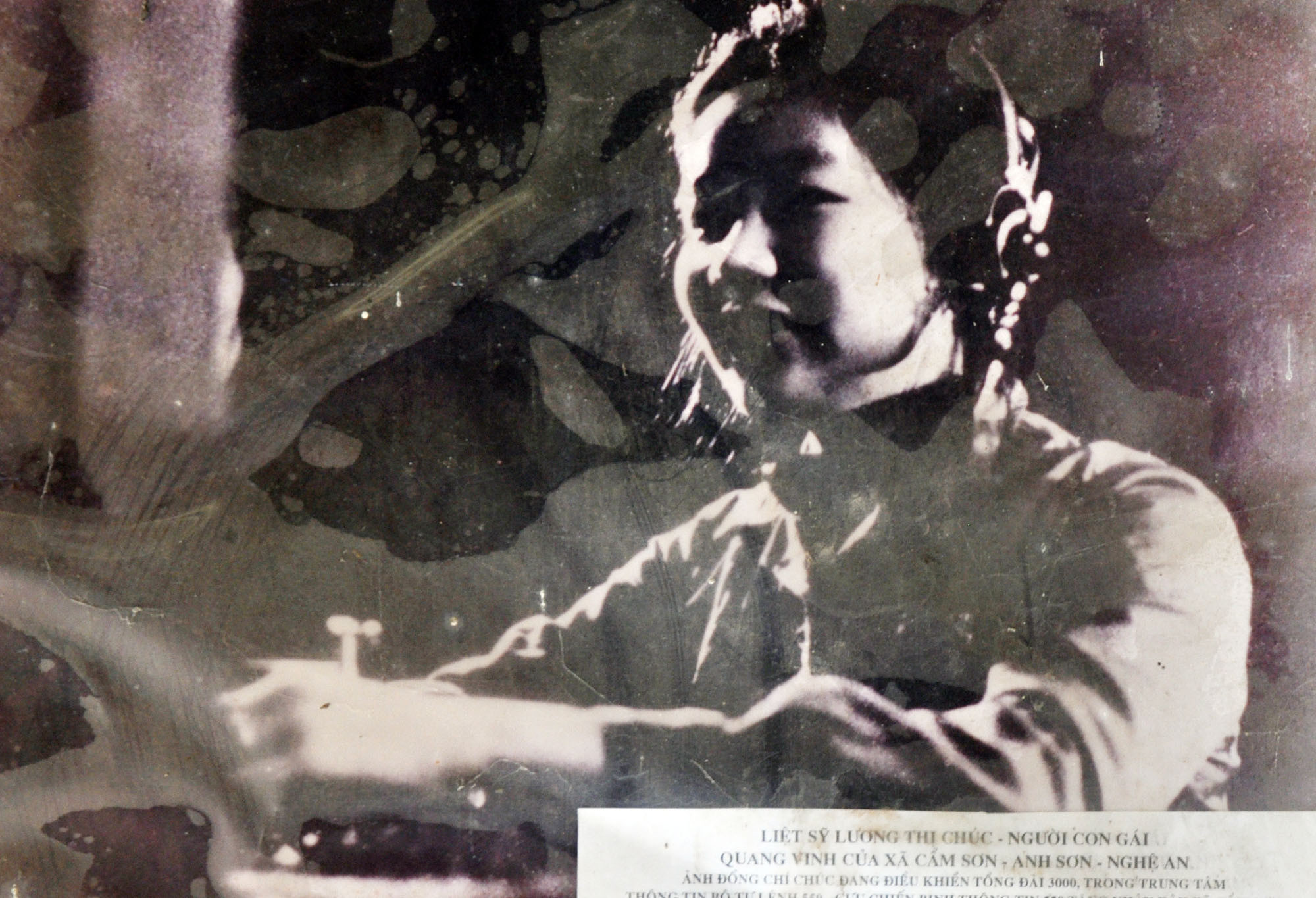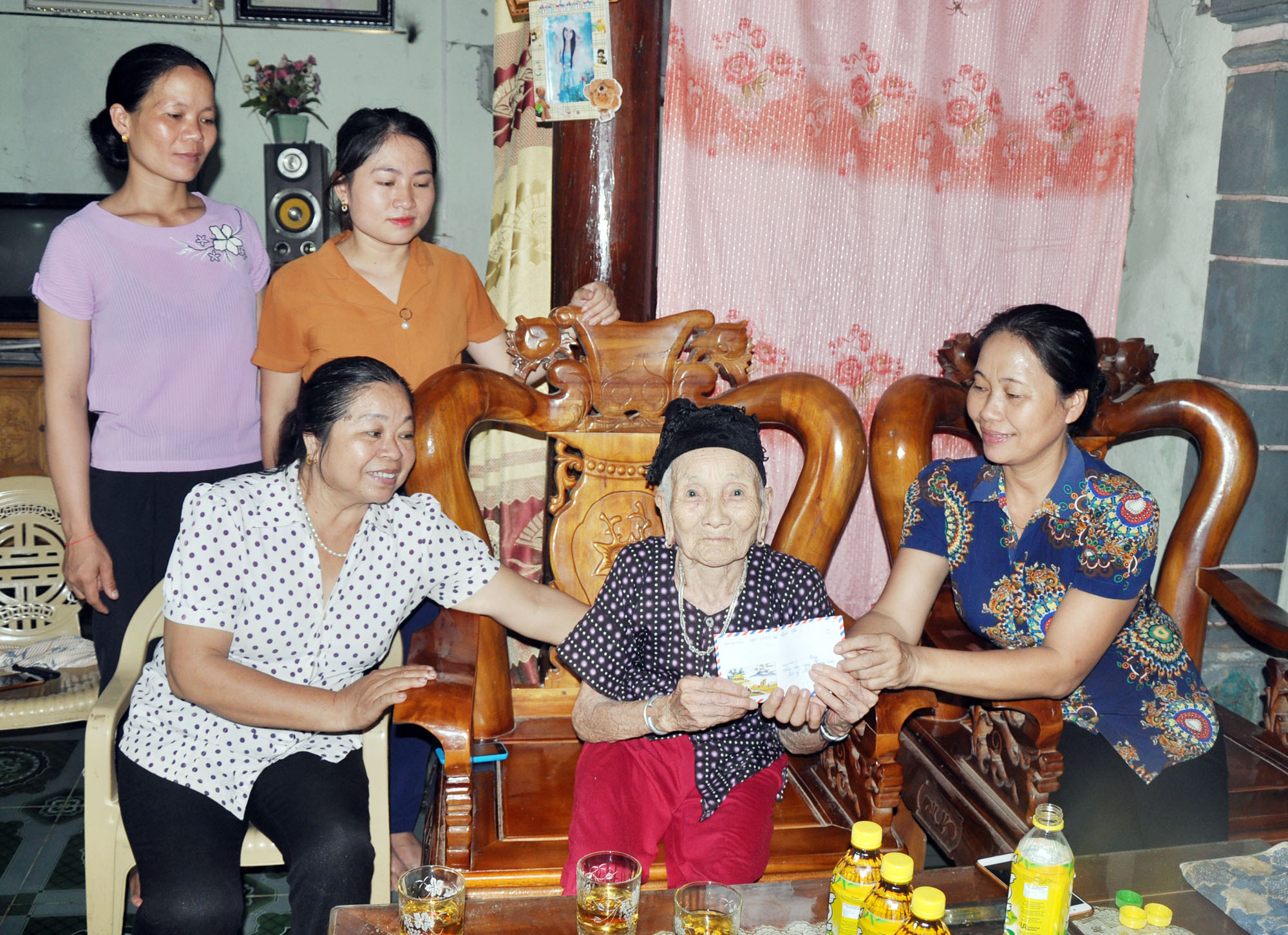Memories of a Mother Nearly 100 Years Old of Her Children Who Remained on the Battlefield
(Baonghean.vn) - Now nearly 100 years old, the war has been over for nearly half a century, but Vietnamese Heroic Mother Vi Thi Quy still cannot forget the memories of her children who sacrificed on the battlefield, and every day she still keeps the habit of sitting and looking out the front door...
One afternoon in late July, like any other day, mother Vi Thi Quy (born 1920) - a Thai ethnic in Cam Loi village, Cam Son commune (Anh Son) asked her daughter to lead her to the front of the house so she could sit and look out at the alley. Her white hair and smoky eyes seemed to be looking forward and waiting for her children who had gone far away.
 |
| For decades, every afternoon, Vietnamese Heroic Mother Vi Thi Quy often sits looking out the alley as if expecting and waiting... Photo: Cong Kien |
It was difficult to move around and her health had declined significantly, but Mom still remembered clearly the stages of her life and the joys and sorrows of her family. Mom said: “Last night, I dreamed that Binh and Chuc came back. They stood there looking at me for a while before quietly leaving…”
Mother Vi Thi Quy's seven children (1 boy, 6 girls) all grew up in poverty, their meals consisted mostly of cassava and sweet potatoes, and each year they only had a few meals of white rice. The family had many children, they worked hard all year round, and they were illiterate so Mother could not remember the year of birth of each child. Luong Xuan Binh, the eldest son (also the only son) of Mother grew up in the midst of war, with enemy bombs and bullets falling on the village and homeland every day.
 |
| Currently, mother Vi Thi Quy lives with her youngest daughter and her husband, Luong Thi Doi - Nguyen Van My, in Cam Loi village, Cam Son commune (Anh Son). Photo: Cong Kien |
That day, a few days after the wedding, returning from the fields, Binh asked his parents' permission to register for military service. His mother was hesitant because her eldest son had just gotten married and had younger siblings. Her husband (Mr. Luong Van Em) was a local official and could not help with housework much. But Binh was determined, so his mother had to comply.
At the farewell meal for her son, Quy's mother pounded all the sticky rice she had stored since the beginning of the year to make sticky rice, and that day the whole family had a sumptuous meal. At dawn, Binh put on his backpack and set off, his mother followed him to the top of Bam slope, watching his every step, and only when his figure disappeared behind the trees in the distance did she return.
During the years Binh was in the battlefield, Quy's mother and her husband did not receive any news of their son. Her husband said that the war was getting more and more fierce, the country was divided so he could not send letters home. During the day, she worked hard to earn potatoes and cassava to feed her children, and at night, thinking of her son in the battlefield, her heart burned like fire.
 |
| Photo of martyr Luong Thi Chuc (Mother Quy's third child) in the communication bunker in the middle of Truong Son mountain forest. Photo: GĐCC |
Then one day in the middle of 1969, while working on the riverbank, she received the news that her brother Binh had died. She collapsed next to the unfinished rows of potatoes. She thought she would never be able to get up, but when she opened her eyes and saw her young children, she tried to muster the remaining strength to go to the riverbank to continue planting rows of potatoes.
“Decades have passed, I still miss and love Binh very much. He sacrificed himself without even a picture to put on the altar. A few days after getting married, he joined the army, and he and his wife did not have children yet” – Quy’s mother choked up.
After Binh died, a few months later, Luong Thi Chuc - the third child of Quy's mother and father - asked to join the youth volunteer force. Knowing that she could not stop him, his mother had to let her go, even though her heart was in turmoil, filled with anxiety and worry. Chuc went to the battlefield, operating in the Truong Son mountains and forests. In her letters, she told her parents and sisters about the hardships and dangers and her determination to complete her mission.
The last letter Mother received, Sister Chuc announced the good news to her family that she had just been transferred to the signal troops of Group 559. Along with the letter was a photo of Sister Chuc sitting in the bunker, a radio in her ears, her face radiant, a charming smile on her lips.
 |
| Officials of the Women's Union of Cam Son commune visited and presented gifts to Vietnamese Heroic Mother Vi Thi Quy on the occasion of War Invalids and Martyrs Day (July 27). Photo: Cong Kien |
Mom still keeps that photo, but nearly 50 years have passed so the photo has faded a lot. A few months after that letter, Mom was stunned in the middle of the corn field when she heard that her daughter had died in the mountains of Quang Tri. For months, Mom lay there hugging Chuc’s photo and crying, crying until her tears ran dry…
Not long after Sister Chuc died, Mother and her husband received news that their son-in-law, Mr. Ha Ngoc Thanh (husband of the second daughter), had died on Phu Quoc Island. Mother cried her eyes out for her young grandchild who had lost his father, and for her son-in-law who was left behind in the vast ocean...
If counting the age of the midwife, in 2019 Mother Vi Thi Quy will turn 100 years old - an age that many people have longed for. Her wishes were fulfilled when her sacrificed children were laid to rest at the Vietnam - Laos cemetery, just over 10 kilometers from home. Mother Quy's husband passed away nearly 20 years ago, and she currently lives with her youngest daughter, Luong Thi Doi, and her husband.
Although she still misses her children, Heroic Vietnamese Mother Vi Thi Quy is encouraged that her children and grandchildren have warm and happy families, and their lives are increasingly prosperous. She receives attention, care, and support from society; on holidays and Tet, she receives visits and encouragement from the government and organizations, and her heart feels warmed after the loss and pain...

